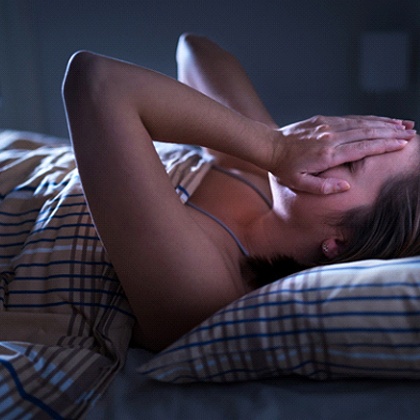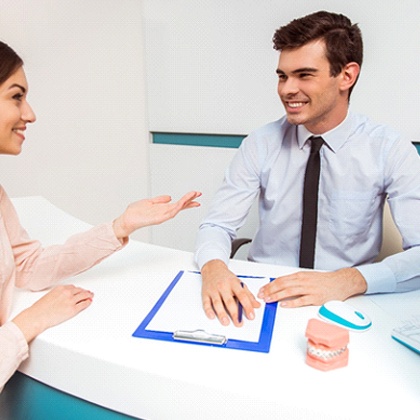Sleep Apnea Treatment
Get to the Root of Your Poor Sleep
When you wake up feeling groggy or tired, you may think that you just had an off night and decide to power through it. But when it starts to become a pattern and you can’t get a good night’s sleep even if you get to bed early and make healthy changes to your diet, then you may need professional intervention with sleep apnea therapy at our Lake Nona Region dental office.
Sleep apnea remains one of the most underdiagnosed conditions in the country, mainly because it can be difficult to diagnose without a professional by your side to help. At Lake Nona Dental Group, we can not only help you build a sleep apnea diagnosis, but provide treatment options so you can start feeling rested again. Give us a call today to learn more!
Why Choose Lake Nona Dental Group for Sleep Apnea Therapy?
- Custom-Made Oral Appliances Available
- Expanders to Prevent Underlying Causes
- At-Home Sleep Testing for Diagnosis
What is Sleep Apnea?

Sleep apnea is a condition characterized by interrupted breathing during sleep as a result of oral blockages. This type is known as obstructive sleep apnea (or OSA) and is the most common form of sleep apnea diagnosed. Blockages generally occur due to oral tissues relaxing and then falling towards the back of the mouth. In order to prevent suffocation, the body forces itself awake, making it very difficult to achieve the deep states of sleep needed to feel rested upon waking up.
The other less common form of sleep apnea is central sleep apnea (or CSA) and occurs when the brain doesn’t send proper signals to the muscles to control breathing.
There are many symptoms that can develop due to having sleep apnea. Paying close attention to these symptoms can be particularly important if you share a bed with someone who may exhibit them. The most common symptoms include:
- Restless sleep
- Chronic snoring
- Daytime fatigue
- Mood swings or irritability
- Slowed reaction times
- Forgetfulness or short-term memory issues
- Headache and sore throat upon waking up
- Waking up to urinate in the middle of the night
The Dangers of Sleep Apnea

It’s clear that sleep apnea can affect your quality of life since it can be difficult or even impossible to get good rest every night. When you can’t get good rest, it becomes more difficult to concentrate or be productive throughout the day. Work can become more stressful and take longer to complete. Depending on your career, you might even be putting yourself in harm’s way if you drive or operate heavy machinery.
However, the consequences of untreated sleep apnea are not exclusive to the short-term. In the long-term, sleep apnea can cause issues with memory, the heart, brain, and immune system. Studies have shown there is a connection between this chronic condition and type 2 diabetes, stroke, and heart attacks.
Sleep Apnea Treatment Options

The good news is there are multiple options out there to treat and manage your sleep apnea. One of the more well-known options is using a continuous positive airway pressure (CPAP) machine. For many, this appliance is too intrusive and difficult to use. Alternative options like oral appliance therapy, available at our office, provide an easier solution to chronic sleep apnea symptoms.
Not only is the oral appliance customized to fit your mouth exactly for maximum comfort, but it’s extremely easy to bring with you while traveling. Simply wear the appliance before going to bed to expand your airway and allow improved oxygen flow.
Additionally, if you need help diagnosing sleep apnea or staying proactive against the condition before it has a chance to develop, we offer at-home sleep testing and expansion appliances in-house.
Sleep Apnea FAQs
Can I Diagnose Sleep Apnea On My Own?
Once you familiarize yourself with the symptoms of sleep apnea, you may think that you have enough information to tell whether you have the disorder on your own. However, this is simply not the case; even though snoring and other symptoms are closely associated with sleep apnea, the presence of one doesn’t always guarantee the presence of the other.
There’s only one way to have your sleep apnea properly diagnosed: undergo a sleep test. This can be done at a lab or in the comfort of your own home. A special device will be used to monitor your breathing and other types of body activity while you sleep. Then a sleep doctor can review the results and figure out whether your symptoms are the result of sleep apnea or something else. Once your sleep apnea has been diagnosed, you can get the treatment that you need to improve the quality of your slumber.
Will Oral Appliance Therapy Make CPAP Therapy Unnecessary?
Possibly. Some patients – particularly those with mild to moderate cases of sleep apnea – can stop using their CPAP machines once they start wearing a fully personalized oral appliance. However, CPAP therapy may still be the better option for those with severe sleep apnea symptoms. Additionally, there are situations where the patient may benefit from combining oral appliance therapy with CPAP therapy.
If you’re thinking about switching from CPAP to an oral appliance, you will need to talk to your sleep doctor as well as your dentist. They can help you figure out what the best treatment is in your specific case.
Will My Sleep Apnea Go Away If I Lose Weight?
Being overweight is considered a major risk factor for sleep apnea; this is because fat deposits can build up in the neck and potentially block the airway, thus interrupting your breathing. In many cases, losing weight can help reduce your sleep apnea symptoms. However, there’s no guarantee that it will get rid of the disorder entirely. To check whether sleep apnea is still present after weight loss, you will need to have a new sleep test performed.
How Should I Clean My Sleep Apnea Oral Appliance?
You will be putting your oral appliance in your mouth every night. As such, it’s essential to keep it as clean as possible in order to minimize your risk for infections and other oral health issues.
Whenever you take your oral appliance out in the morning, you should brush it thoroughly with a soft-bristled toothbrush before rinsing it off. Additionally, you can soak your oral appliance in a denture cleaner once a week for about 10 minutes. Once you’re done cleaning your oral appliance, be sure to store it properly; it should always be in its case whenever you’re not wearing it.
I Need a Checkup & Cleaning I am Concerned About Bleeding Gums I Have a Cavity or Broken Tooth I am Missing One or More Teeth I Want to Enhance My Smile I Want a Straighter Smile I am in Pain & Need Help I Need My Wisdom Teeth Removed I am Concerned about Sleep Apnea View Our Services


